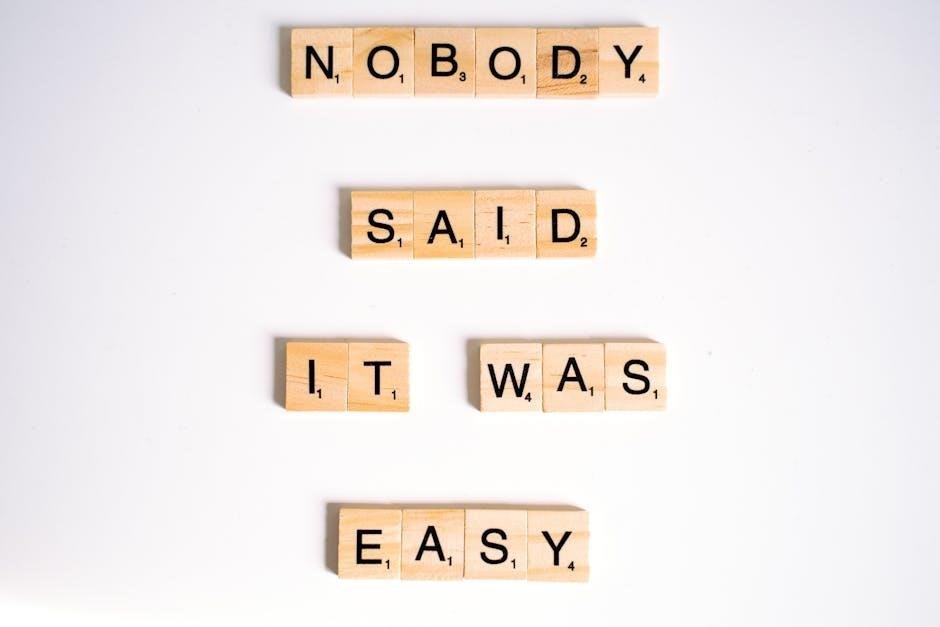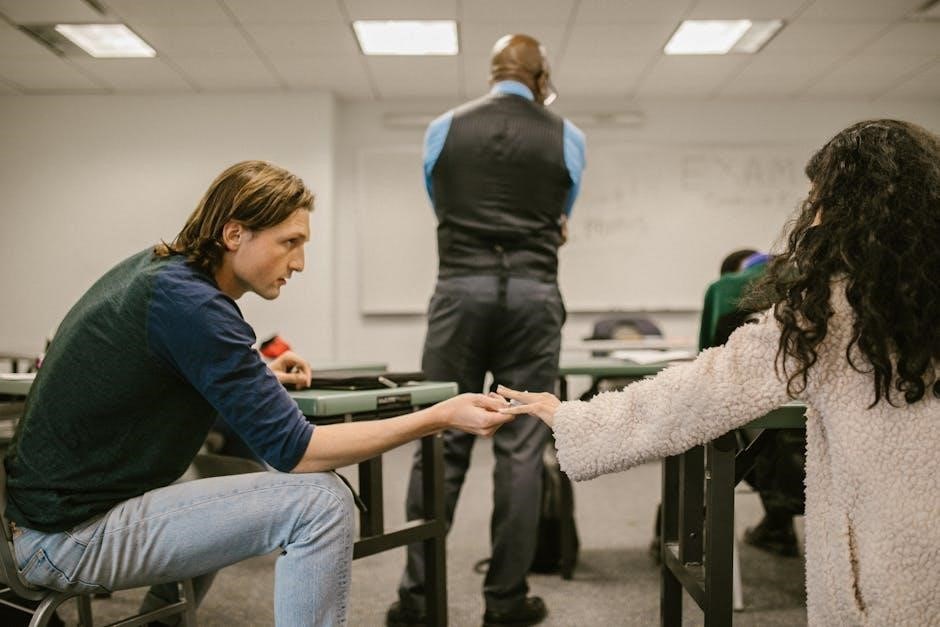Dan Ariely’s The Honest Truth About Dishonesty explores the universal nature of dishonesty, revealing how psychological experiments uncover the roots of cheating and lying in everyday life․
Overview of the Book and Its Author, Dan Ariely
Dan Ariely, a renowned behavioral economist, explores the intricacies of dishonesty in The Honest Truth About Dishonesty․ Through groundbreaking research, Ariely reveals how dishonesty permeates everyday life, from minor white lies to significant fraud․ His work challenges the notion that dishonesty is solely driven by rational decision-making, instead highlighting the role of psychological and environmental factors․ Ariely’s expertise in behavioral economics, combined with his engaging writing style, makes the book accessible to a broad audience․ Published in 2012, the book has garnered widespread acclaim for its insightful analysis of human behavior, offering a deeper understanding of why we lie and how we justify such actions to ourselves and others․
The Central Theme: Understanding Dishonesty in Everyday Life
In The Honest Truth About Dishonesty, Dan Ariely delves into the pervasive nature of dishonesty, arguing that it is an inherent yet often overlooked aspect of human behavior․ Ariely contends that dishonesty is not confined to grand acts of deception but is present in the smallest, most mundane lies we tell ourselves and others․ He explores how individuals rationalize their dishonest actions, often maintaining a positive self-image despite engaging in unethical behavior․ By examining real-world examples and experimental data, Ariely illustrates that dishonesty is shaped by psychological, social, and environmental factors, making it a universal challenge that affects everyone, regardless of moral upbringing or societal expectations․

The Concept of Dishonesty
Dishonesty involves lies, cheating, and deception, often justified through rationalization, making it a complex and universal human behavior studied extensively by Dan Ariely․
Defining Dishonesty: Lies, Cheating, and Deception
Dishonesty encompasses lies, cheating, and deception, all of which involve intentional acts of misleading others for personal gain or to avoid consequences․ Lies are false statements aimed at deceiving, while cheating refers to breaking rules to achieve an unfair advantage․ Deception is a broader concept that includes any act designed to mislead or conceal truth․ These behaviors are universal, occurring in various forms across cultures and societies․ Importantly, dishonesty is not accidental; it involves a deliberate choice to misrepresent reality․ Understanding these definitions helps clarify how dishonesty manifests in everyday life, as explored in “The Honest Truth About Dishonesty․”
Why Dishonesty is a Universal Human Behavior
Dishonesty is a universal human behavior, present across cultures and societies, rooted in psychological and evolutionary factors․ It often stems from self-interest, where individuals seek to gain advantages or avoid punishment․ Humans have an inherent tendency to rationalize dishonest acts, making them seem justifiable․ This behavior is not limited to malicious intent; it can arise from everyday situations where people feel pressured to conform or achieve success․ Dishonesty also serves as a survival mechanism, allowing individuals to navigate complex social dynamics․ Interestingly, most people cheat just enough to benefit without causing significant harm to others, maintaining a balance between self-interest and moral boundaries․ This universality highlights dishonesty as an intrinsic part of human nature․

Factors Influencing Dishonesty
Dishonesty is influenced by personal gain, societal norms, and psychological biases․ Environmental cues, moral rationalization, and emotional states also play significant roles in shaping dishonest behavior patterns․
The Role of Rationalization in Justifying Dishonest Acts
Rationalization is a powerful psychological mechanism that enables individuals to justify dishonest behavior while maintaining a positive self-image․ According to Dan Ariely’s research, people often create mental excuses or reinterpret situations to align their dishonest actions with their moral values․ This process allows individuals to engage in dishonesty without feeling guilty, as they convince themselves that their actions are justified or less harmful than they truly are․ For instance, stealing small items or lying about minor issues can be rationalized as insignificant, making dishonesty more acceptable․ This mental balancing act highlights how rationalization serves as a moral “safety net,” enabling dishonesty to coexist with self-perceived honesty․
How Environment and Context Shape Dishonest Behavior
The environment and context in which individuals find themselves play a critical role in shaping dishonest behavior․ According to Dan Ariely’s research, situational factors such as social norms, anonymity, and the presence of others significantly influence the likelihood of dishonest acts․ For instance, people are more likely to cheat or lie when they believe others are doing the same, as dishonesty becomes normalized․ Additionally, environments that lack clear moral guidelines or oversight can create opportunities for dishonesty to thrive․ Conversely, contexts that promote transparency, accountability, and ethical behavior can discourage dishonest actions․ Thus, understanding how environments shape behavior is key to fostering honesty and reducing dishonesty in various settings․
The Impact of Psychological and Social Factors
Psychological and social factors significantly influence dishonest behavior, often unconsciously․ Cognitive dissonance, for instance, drives individuals to justify dishonest acts to maintain self-perception․ Emotional states, such as stress or frustration, can lower moral inhibitions, making dishonesty more likely․ Social norms also play a role; people are more inclined to cheat when they perceive dishonesty as common or acceptable in their group․ Peer pressure and the desire for social approval further exacerbate dishonest tendencies․ These factors highlight how internal motivations and external pressures interact to shape behavior․ Understanding these dynamics is essential for addressing dishonesty effectively, as they often operate beneath conscious awareness, influencing decisions in subtle yet profound ways․

Behavioral Economics and Dishonesty
Behavioral economics explores how psychological, social, and economic factors influence dishonesty, revealing that dishonesty is not purely rational but often driven by context and emotional motivations․
Key Insights from Behavioral Economics Research
Behavioral economics research, as explored in The Honest Truth About Dishonesty, reveals that dishonesty is not solely driven by rational decision-making but is deeply influenced by psychological and social factors․ Dan Ariely’s experiments demonstrate that people are willing to bend the truth, but only up to a point, as they strive to maintain a positive self-image․ These studies show that dishonesty is context-dependent, often triggered by environmental cues rather than pure self-interest․ Furthermore, the research highlights the role of rationalization, where individuals justify unethical behavior to themselves, and how subtle changes in context can significantly reduce dishonesty․ This challenges traditional economic assumptions of purely rational behavior․
Experiments Revealing the Nature of Cheating and Lying
Dan Ariely’s experiments in The Honest Truth About Dishonesty provide groundbreaking insights into the mechanics of dishonesty․ One notable study involved participants solving math problems, where dishonesty was measured by self-reported scores․ Results showed that people cheat, but not excessively—they lie just enough to benefit without losing their moral self-image․ Another experiment tested the impact of moral reminders, such as the Ten Commandments, which significantly reduced dishonest behavior․ These experiments reveal that dishonesty is not purely rational but is influenced by context, self-perception, and subtle external cues․ They also highlight the universal tendency to cheat while maintaining a positive self-image, offering a nuanced understanding of human behavior․

The Psychology of Self-Deception
Self-deception allows individuals to justify dishonest acts while maintaining a positive self-image, often through cognitive dissonance and rationalization, enabling them to cheat without guilt․
How People Lie to Themselves and Others

People often engage in self-deception to align their actions with their moral values, creating a mental disconnect between their true behavior and self-perception․ This process involves rationalizing dishonest acts, such as cheating or lying, to maintain a positive self-image․ Self-deception allows individuals to believe they are honest while still benefiting from dishonest behavior․ When lying to others, people may use subtle manipulations or outright falsehoods, often justified by personal gain or fear of consequences․ This duality—lying to oneself and others—highlight the complex interplay of psychology, morality, and social dynamics that drive dishonesty, ultimately undermining trust and relationships in both personal and professional spheres․
The Paradox of Maintaining a Positive Self-Image While Being Dishonest
Dishonesty creates a psychological conflict as individuals strive to preserve a positive self-image despite engaging in unethical behavior․ People often rationalize their dishonest actions, convincing themselves that their behavior is justified or less harmful than it truly is․ This mental balancing act allows individuals to maintain a moral self-perception while still benefiting from dishonesty․ Society’s moral standards further complicate this paradox, as individuals may feel pressure to conform to ethical norms even when their actions contradict them․ This internal struggle highlights the complex interplay between self-deception, morality, and behavior, revealing how dishonesty can coexist with a positive self-image, often unconsciously․

Dishonesty in Various Aspects of Life
Dishonesty permeates personal relationships, workplace dynamics, education, and business, manifesting as lies, cheating, or ethical violations, reflecting a complex aspect of universal human behavior and societal standards․
Dishonesty in Personal Relationships
Dishonesty in personal relationships often stems from fear of conflict or a desire to avoid hurting feelings, leading to small lies or omissions․ Over time, these can escalate, creating a web of deceit that erodes trust and intimacy․ People may rationalize their dishonesty, believing it protects their partner or maintains harmony․ However, this behavior frequently backfires, causing deeper emotional pain when the truth surfaces․ Additionally, dishonesty can involve self-deception, where individuals convince themselves their actions are justified, further complicating the dynamics․ Ultimately, dishonesty in personal relationships undermines the foundation of trust, leading to feelings of betrayal and damage to emotional connections, making reconciliation challenging and often unsuccessful․
Dishonesty in the Workplace and Business
Dishonesty in the workplace and business often arises from the pressure to meet targets, compete, or achieve financial gains․ Employees may engage in cheating, fraud, or ethical violations to gain an advantage․ According to Dan Ariely, rationalization plays a significant role, as individuals justify their dishonest actions as necessary for success․ This behavior is further fueled by environments that prioritize results over ethics․ Dishonesty can also spread through group behavior, as individuals follow the norms set by others․ The consequences include damaged trust, reputational harm, and legal repercussions, ultimately undermining organizational integrity and long-term success․ Addressing dishonesty requires fostering a culture of transparency and accountability․
Dishonesty in Education and Academia
Dishonesty in education and academia manifests through cheating, plagiarism, and falsifying data․ Students often justify dishonest actions by comparing themselves to others or feeling pressured to succeed․ In academia, researchers may fabricate results to secure funding or publish papers․ Dan Ariely’s research highlights how rationalization and environmental factors, like competitive atmospheres, encourage such behavior․ The consequences include erosion of trust in institutions and the undermining of the education system’s integrity․ Addressing dishonesty in education requires fostering a culture of honesty, transparency, and accountability to uphold the values of learning and intellectual integrity․

Consequences of Dishonesty
Dishonesty leads to feelings of guilt and shame, damaging relationships and reputations․ Over time, it erodes trust, creating social and economic challenges․
Short-Term vs․ Long-Term Effects of Dishonest Behavior
Dishonest behavior often brings immediate relief or benefits, such as avoiding conflict or gaining an advantage․ However, these short-term gains are overshadowed by long-term consequences․ Over time, dishonesty erodes trust, damaging relationships and reputations․ Individuals may experience guilt, anxiety, or even self-loathing, which can harm mental health․ Furthermore, dishonesty can create a cycle of deception, as maintaining lies becomes increasingly complex․ In personal and professional contexts, the loss of credibility can lead to isolation and missed opportunities․ Ultimately, the cumulative effects of dishonesty undermine personal integrity and societal cohesion, highlighting the importance of honesty for long-term well-being and ethical living․
How Dishonesty Affects Trust and Reputation
Dishonesty profoundly erodes trust and reputation, often with irreversible consequences․ When individuals or institutions engage in deceptive behavior, they jeopardize the faith others have placed in them․ Trust, once broken, is difficult to rebuild, leading to strained relationships and skepticism․ Reputation, whether personal or professional, becomes tarnished, affecting how others perceive and interact with the individual or organization․ The loss of credibility can extend beyond immediate circumstances, influencing future opportunities and collaborations․ Dishonesty fosters a cycle of mistrust, creating a ripple effect that spreads beyond the initial act․ Ultimately, the damage to trust and reputation underscores the enduring impact of dishonesty on personal and societal levels․

Strategies to Mitigate Dishonesty
Fostering ethical behavior through reminders and transparency, simplifying rules, and rewarding honesty are key strategies to mitigate dishonesty and promote integrity in individuals and organizations․
The Role of Ethics and Moral Education
Ethics and moral education play a crucial role in reducing dishonesty by instilling a strong sense of right and wrong․ Studies show that reminding individuals of moral standards can significantly decrease dishonest behavior․ Simplifying ethical guidelines and making them accessible helps people adhere to them without feeling overwhelmed․ Moral education also fosters self-awareness, enabling individuals to recognize when they are rationalizing unethical actions․ By integrating ethical principles into daily life, societies can create a culture where honesty is valued and dishonesty is discouraged․ This approach not only reduces cheating and lying but also promotes long-term integrity and trustworthiness in individuals․
Creating Environments That Encourage Honesty
Creating environments that encourage honesty involves fostering trust, transparency, and clear ethical guidelines․ When individuals feel trusted and valued, they are more likely to act honestly․ Establishing consistent consequences for dishonesty and rewarding honest behavior can also promote integrity․ Leadership plays a key role in setting the tone, as ethical leaders inspire others to follow suit․ Additionally, reducing opportunities for cheating and ensuring fairness in systems can minimize dishonesty․ Open communication channels and anonymous reporting mechanisms further encourage honesty․ By designing environments that prioritize ethics and accountability, societies can cultivate a culture where honesty is the norm, reducing the likelihood of dishonest behavior․
Dan Ariely’s exploration of dishonesty reveals its deep roots in human nature, emphasizing the need for awareness and ethical frameworks to foster honesty and trust in society․
Final Thoughts on the Prevalence and Impact of Dishonesty

Dan Ariely’s work underscores the pervasive nature of dishonesty, revealing it as an inherent yet manageable aspect of human behavior․ While dishonesty is widespread, its impact varies, often eroding trust and damaging relationships․ Ariely emphasizes that dishonesty is not solely malicious but often stems from rationalizations that allow individuals to maintain a positive self-image․ The book highlights the subtle ways dishonesty seeps into everyday life, from minor lies to significant deceptions, affecting personal, professional, and societal structures․ Understanding these dynamics is crucial for fostering honesty and creating systems that discourage dishonest behavior, ultimately promoting a more ethical and trusting world․
The Importance of Understanding and Addressing Dishonesty in Society
Understanding dishonesty is vital for building a more ethical and cohesive society, as it allows us to address the root causes of deceptive behavior․ By recognizing how rationalizations and environmental factors drive dishonesty, we can create systems that encourage honesty and accountability․ Addressing dishonesty fosters trust, strengthens relationships, and promotes fairness in both personal and professional spheres․ Moreover, it enables societies to develop robust institutions and policies that uphold integrity․ Ignoring dishonesty can lead to widespread corruption and erosion of social bonds․ Therefore, confronting dishonesty with empathy and evidence-based strategies is essential for cultivating a more honest and harmonious world․



